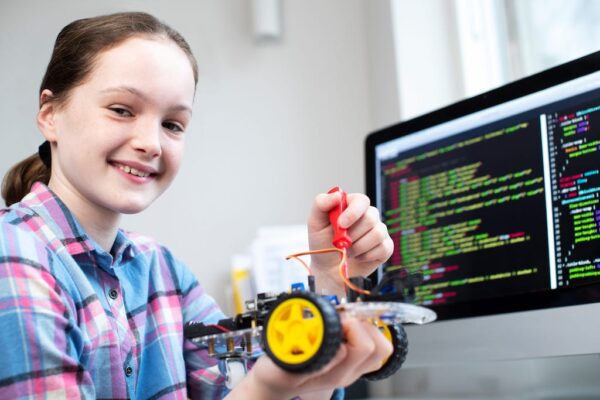
Fuelling Young Minds: Children are Learning to Code as Young as Five

The opportunities for children to develop their tech skills are broader than ever. From learning to code as part of the UK curriculum to playing popular coding-inspired games such as Roblox, Scratch, Robocode, CodeCombat, and Codewars, learning to code has become as common as learning to read or write. If you’re a regular Roblox player, you may be interested in learning how to get free robux on roblox. In 2014, Britain became the first G7 country to introduce compulsory computer science on the school curriculum for all children aged five to 16.
Children are proving that it’s never too early to become digital innovators, and this growing trend is preparing the youth of today for the jobs of the future.
As the importance of tech literacy continues to rise, home schooling has also adapted to incorporate these essential skills into children’s education. With the flexibility of home schooling programs, families are exploring innovative ways to introduce coding and computer science concepts to their children. The emergence of online platforms and resources tailored for home education, such as International Home Study, provides access to a wealth of interactive tutorials, coding challenges, and virtual classrooms. Parents are increasingly recognizing the value of integrating tech education into their children’s learning journey, equipping them with the digital fluency needed to thrive in the modern world.
With hundreds of coding apps appropriate for varying age groups available online, including Code.Org and Blockly, a diverse mix of young people are now getting exposure to and engaging proactively with tech skills.
As technology continues to permeate every aspect of our lives, the importance of ensuring inclusivity in tech education becomes increasingly evident. Organizations such as kids on the move recognize the significance of providing tailored support like autism nonprofit and resources to children on the autism spectrum, enabling them to harness their potential in the digital realm. Through specialized programs and interventions, these centers offer a supportive environment where children with autism can explore coding and other tech skills at their own pace, fostering not only technical proficiency but also enhancing social interaction and communication abilities.
By collaborating with kids on the move, educational institutions, and tech companies, we can further bridge the gap in tech education and ensure that children of all abilities have equal access to learning opportunities. Through such concerted efforts, we empower the next generation to not only embrace the digital age but also contribute to it in meaningful and diverse ways, enriching both the tech industry and society as a whole.
Louise Clayton leads a team of more than 30 specialists at international tech firm, Talk Think Do. As an employer in one of the fastest-moving sectors in the world, Louise says that developing a diverse, tech-literate generation is of utmost importance.

“By engaging with code at a young age, children gain a head start in building a solid foundation for potential future careers in fields such as software development, data science, robotics, and artificial intelligence. This generation’s early exposure to the field means the workforce of the future will be agile and able to adapt to changes in the industry.”
Code powers the technologies that have become an essential part of our lives, and a variety of programming languages are deployed by software engineers to write these crucial applications. Commenting on fluency in coding language, Louise said: “With the next generation developing literacy in coding languages from a young age, we’re on track as a society to have a sizeable pool of talent ready to hit the ground running in the jobs of the future. Having access to increased hires who are already confident in relevant languages will lead to more efficient and profitable businesses.
“This generational shift will also change the game when it comes to hiring in tech. As coding skills become more common across talent entering the job market, I would expect talent to become more affordable, opening up opportunities across sectors.”
Computing skills have long been determined as a key skill for future generations, but Louise also argues that developing an interest in and understanding of code will give the next generation of entrepreneurs and leaders tomorrow a strong start: “Behind a software engineer’s coding skill sits an impressive ability to problem-solve, troubleshoot, and find efficient solutions. These valuable skills extend beyond programming and will be preparing the next generation to tackle challenges in various other aspects of life.”
Recognising the significance of coding; schools, businesses, and educational institutes across the globe have embraced a forward-thinking approach, incorporating coding into their curriculum to foster critical thinking among their young learners.
Teaching children essential coding and programming skills is a long-term solution to the “skills gap”. Encouraging children to learn to code from an early age and developing an increasingly tech-literate generation is essentially futureproofing the workforce.
To learn more about Talk Think Do visit www.talkthinkdo.com.














































